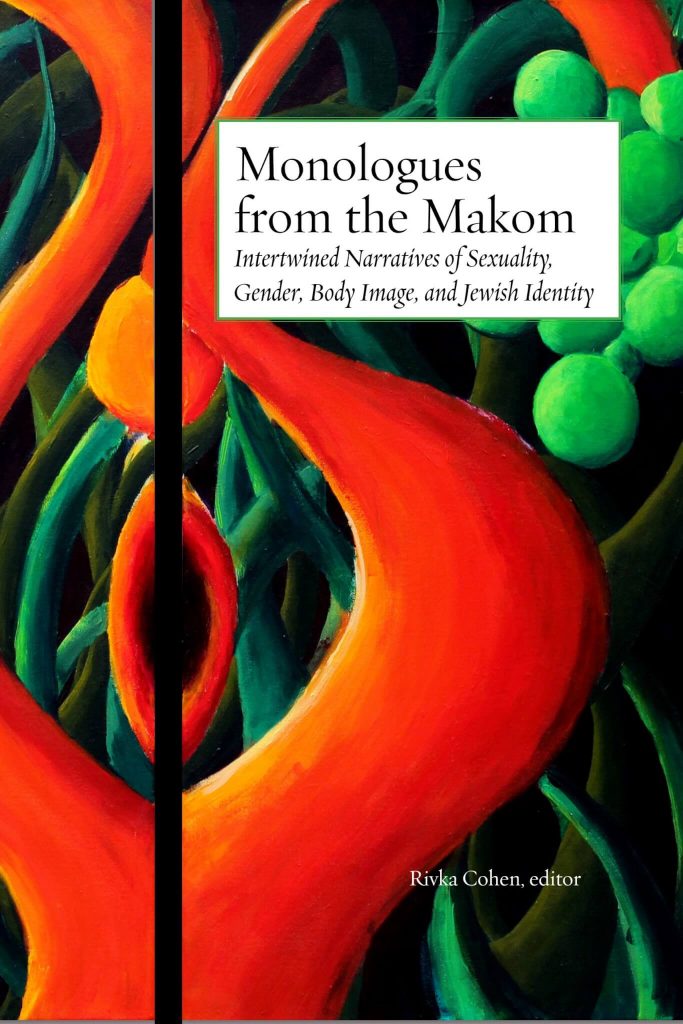Monologues from the Makom is an exciting collection of brave, bold work by Jewish women on a mission to break the taboo surrounding female sexuality in their religious communities. Featuring a mix of poetry and prose, all the pieces in the book are personal, raw, and enrapturing.
“Monologues from the Makom: Intertwined Narratives of Sexuality, Gender, Body Image, and Jewish Identity” is edited by Rivka Cohen, Sara Rozner Lawrence, Sarah Ricklan, Rebecca Zimilover, and Naima Hirsch. “Makom” is the word for ‘place’ in Hebrew, but also doubles as euphemisms for ‘vagina’ and ‘God.’ Witty.

The project is the brainchild of Sara Rozner Lawrence. Monologues From the Makom actually has its origin story on a college campus several years ago. Rozner was a freshman when she attended a production of The Vagina Monologues. The well-known play has been praised by the New York Times for its impact worldwide. In The Vagina Monologues, themes of menstruation, sex, rape, genital mutilation, and body image are explored through monologues. The stories are told by a diverse set of women to appeal and depict women of all backgrounds. But when Rozner witnessed the event, she felt her Orthodox Jewish identity was not represented. A seed was planted in the back of her mind.
Creating a Safe Space
Rozner learned two things that night. One–we already discussed–she sought a place where her own identity would be represented. Two, she also knew her friends wouldn’t be comfortable at such an event. She wanted to find a way to bring the two worlds together. A safe space for religious Jewish women to discuss their sexuality. As a freshman in university, this was a daunting task. Rozner wanted to do it right, so she waited until she was ready.
Three years later, Rozner found herself at another event. This time she was at a Shabbaton, an extended Shabbat-like retreat. The theme was Jewish women and the arts. Little did Rozner expect to run into some inspiration. One woman there presented a piece about her own sexuality, which struck Rozner as a vagina monologue, of sorts.
Incredibly moved by the writing, its themes, and the fact that a visibly observant Jewish person was telling her story, Rozner, now older and wiser, was ready to embark on her mission. She brought Monologues from the Makom to life in 2016 in a Washington Heights apartment. The event was open to anyone who identified as female, regardless of gender expression. Sixty women packed into a tight NYC apartment to come together and listen. Quite a turn-out–definitely more than just Rozner’s circle of friends. It’s clear there is a hunger for a safe space where women can express themselves in honest ways.
See Also: Diversify Your Bookshelf: 27 Black #OwnVoices YA Books
Bringing the Space to Life
If Rozner was worried she would need to beg women to present, that was not the case. Seventeen women spoke on topics such as periods, menstrual cups, masturbation, and gender expression. There was art, poetry, prose, and all sorts of creative expressions.
The energy in the room was palpable as peers snapped, cheered, cried and attentively listened to two hours of presentations. No topic was taboo as presenters dealt with a wide range of issues. Some spoke about masturbating and feeling comfortable with their periods and bodies. One woman highlighted how Torah sources discuss sex freely, while today’s Orthodox community is silent. The issue of sex education in girls-only religious high schools was also raised. One student shared a painting of her vagina. Others read deeply personal pieces about trying to ignore their sexuality, coming to terms with one’s gender identity, and the pain caused by the lack of acceptance of LGBTQ individuals within the Jewish community.
https://yuobserver.org/2016/05/monologues-from-the-makom-embracing-jewish-women-and-their-sexuality/
I can only imagine how warm, welcoming, and freeing the environment in that tight apartment must have felt. I’d guess the experience was similar to the one so many women had while watching Wonder Woman for the first time. Being in that dark theater with an unapologetic woman flying through the air, kicking ass, and being supported by a tribe of powerful women… it was exhilarating. It felt like being seen and accepted for the first time, that warm, swelling feeling that eats up everything else inside your chest. All the doubt, the fear, they were gone, as if they’d never existed. That might have been a fraction of how the women at that inaugural Monologues From the Makom felt.
Publishing the Collection
Some attempt to have collected these stories, these feelings, has been made with the publication of “Monologues from the Makom: Intertwined Narratives of Sexuality, Gender, Body Image, and Jewish Identity” from Ben Yehuda Press. To preserve them for women who couldn’t be there for the live presentations. To help them reach more women who need this collection.
It’s unknown how the pieces in the book will hit emotionally without the artist conveying it in front of a live audience. But I trust the editors will have reconfigured pieces, if needed, to make them work. Besides, poetry and prose are forms of art that work well whether read or performed. Finally, it’s not clear if new pieces were curated for the published collection if they were selected from past Monologue from the Makom events or a combination of both.
There are no Monologue from the Makom events planned right now, as with Covid-19, in-person gatherings and events are not happening. But, if women want to get together and share their own stories and art to break down taboos, build stronger communities, and empower women creating your own safe space would be a good place to start.
And after, if you’re looking for more related reading, the graphic memoir What Is Obscenity?: The Story of a Good for Nothing Artist and Her Pussy by Rokudenashiko is a great place to start. Is the true story of Japanese artist Rokudenashiko who was jailed in 2014 for creating the CUTEST 3D art of a mako aka her pussy. Rokudenashiko is another woman seeking to normalize female sexuality in her community the way male sexuality is acknowledged and accepted. The Japanese government found her guilty of obscenity because of the fabulous pussy art she was producing.

See Also: Fight Like A Suffragette: Women’s Equality Day 2020
Women’s Sexuality Does Not Have a Safe Space in the World
Women’s sexuality has always scared the patriarchy. That is why it has been policed, legislated, and governed to the extreme. Women have been shamed for having sexual feelings and acting them. Girls are taught not to talk about their periods, to covertly hide their pads or tampons when they need to change them in school. For some, girls have little to no access to period products to keep themselves clean and safe. Women’s bodies have been sexualized to the point young girls on the street aren’t safe from the male gaze. Breasts, whose purpose is to nourish babies with milk, have been so far divorced from the idea that breastfeeding in public is shamed.
Monologues from the Makom takes an important step towards reshaping the narrative of women’s bodies, lives, and feelings. Hopefully, it brings a little bit of that magical, safe space from a packed Washington Heights apartment, transporting it to every reader who cracks the spine on their copy wherever they are, and whoever they are.


